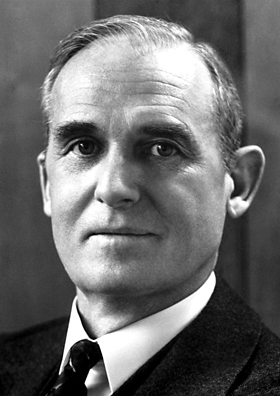William Giauque facts for kids
Quick facts for kids
William Francis Giauque
|
|
|---|---|
 |
|
| Born | May 12, 1895 Niagara Falls, Ontario, Canada
|
| Died | March 28, 1982 (aged 86) Berkeley, California, US
|
| Nationality | American |
| Alma mater | University of California, Berkeley |
| Awards | Elliott Cresson Medal (1937) Nobel Prize for Chemistry (1949) Willard Gibbs Award (1951) |
| Scientific career | |
| Fields | Physical chemistry |
| Institutions | University of California, Berkeley |
William Francis Giauque (born May 12, 1895 – died March 28, 1982) was a famous American chemist. He was born in Canada but became an American citizen. In 1949, he won the Nobel Prize for Chemistry for his amazing work. He studied how matter behaves at extremely cold temperatures, very close to absolute zero. Most of his life, he worked and studied at the University of California, Berkeley.
Contents
Early Life and Education
William Francis Giauque was born in Niagara Falls, Ontario, Canada, on May 12, 1895. His parents were American, so his family moved back to the United States. William went to public schools, mostly in Michigan.
When he was 13, his father passed away in 1908. After this, his family returned to Niagara Falls, Canada. There, he studied at the Niagara Falls Collegiate Institute. After graduating, he looked for jobs in power plants. He wanted to work in electrical engineering and needed money.
Starting a Chemistry Career
William didn't have much luck finding a job in electrical engineering. But then, he got a job at the Hooker Electro-Chemical Company in Niagara Falls, New York. He worked in their laboratory and really enjoyed it. This experience made him decide to become a chemical engineer instead.
After working for two years, he went to the College of Chemistry at the University of California, Berkeley. He earned his Bachelor of Science degree with honors in 1920. He then continued his studies at Berkeley. He received his Ph.D. degree in chemistry in 1922. He also studied physics as a minor subject.
Awards and Recognition
William Giauque was recognized for his important scientific work. In 1936, he became a member of the United States National Academy of Sciences. This is a group of top scientists in the country. He also joined the American Philosophical Society in 1940. In 1950, he became a member of the American Academy of Arts and Sciences.
Scientific Discoveries
When William Giauque started university, he wanted to be an engineer. But he soon became very interested in scientific research. This happened because of a professor named Gilbert N. Lewis. William was a brilliant student. Because of his great work, he became a chemistry instructor at Berkeley in 1922. He moved up through different teaching ranks. By 1934, he was a full professor of chemistry. He retired from teaching in 1962.
Exploring Absolute Zero
William Giauque became very interested in the third law of thermodynamics. This law helps us understand how matter behaves at very low temperatures. He started studying it during his Ph.D. research. He compared how glycerine crystals and glass behaved at cold temperatures.
His main goal was to prove that the third law of thermodynamics is a basic rule of nature. In 1926, he suggested a new way to reach temperatures much colder than 1 Kelvin. One Kelvin is extremely cold, about -457.87 degrees Fahrenheit or -272.15 degrees Celsius.
Between 1933 and 1935, he worked with D.P. MacDougall. They successfully used his new method. He even designed his own special device called a magnetic refrigeration device. This machine helped him get closer to absolute zero than many scientists thought was possible.
Impact of His Research
William Giauque's groundbreaking work did more than just prove a basic law of nature. His discoveries helped make stronger steel and better gasoline. They also led to more efficient processes in many different industries.
His research and his students' work involved measuring entropy at low temperatures. Entropy is a way to measure disorder or randomness in a system. They especially studied condensed gases. They also figured out the entropy and other properties of many gases. They used information from quantum statistics and molecular energy levels.
He also worked with Herrick L. Johnston to study the entropy of oxygen. This led to an amazing discovery: they found oxygen isotopes 17 and 18 in Earth's atmosphere. Isotopes are different forms of the same element. This discovery also showed that physicists and chemists had been using slightly different ways to measure atomic weight for many years without realizing it.
Personal Life
In 1932, William Giauque married Dr. Muriel Frances Ashley. They had two sons together. William Francis Giauque passed away on March 28, 1982, in Berkeley, California.
See also
 In Spanish: William Francis Giauque para niños
In Spanish: William Francis Giauque para niños
 | Chris Smalls |
 | Fred Hampton |
 | Ralph Abernathy |

